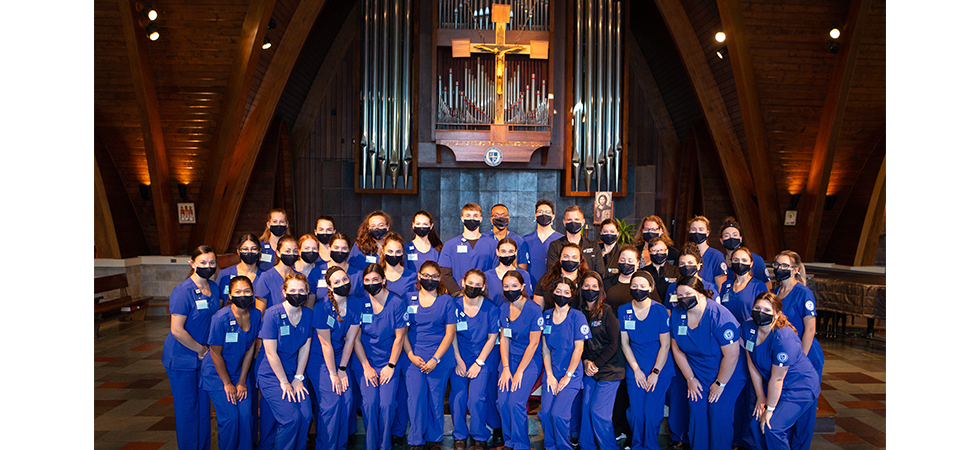Nursing Students Bridge Education and Practice with Blessing of the Hands Ceremony

On Friday, September 3, students enrolled in Assumption’s Froelich School of Nursing participated in the first annual Blessing of the Hands Ceremony to honor the commencement of their clinical education, which began last week. Thirty members of the Class of 2023, including 10 transfer students from Becker College’s nursing program, anointed their hands with oil to signify the importance of the human touch in their nursing careers.
“This morning’s blessing of hands is an important moment in your formation as nurses as we send you out to begin your clinical rotations learning how to apply your knowledge and skills in caring for patients,” said Assumption University President Francesco C. Cesareo, Ph.D. “This ceremony also reflects the distinctive nature of the education you are receiving in the Froehlich School of Nursing as we educate you intellectually, morally, and spiritually in the art and science of nursing as a compassionate healing ministry. That compassion is often conveyed through human touch, which is such a crucial part of health care. Blessing of the hands with oil is a way to acknowledge that importance, while also honoring the spiritual aspects found in physical care.”
Caitlin Stover, Ph.D., RN, dean of the Froelich School of Nursing, shared that the ceremony signified the building of the bridge that connects students’ Catholic liberal education to their professional nursing practice. “Nursing truly is an art and a science, and to be a nurse, practicing compassionate, patient-centered care, one cannot exist without the other,” she said.
She explained that in the weeks, months, and years ahead, the simple task of palpation, or touch, will be conducted countless times, that touch plays a vital role in assessment, the first step in the nursing process. “You will learn to glide, roll, gently push along the skin of your patients, as well as, yes, firmer pressure and probing as the motion for deeper palpation,” she explained. “That is the science, the diagnostic touch, the empirical touch. The touch that we will then accurately document in the Electronic Health Record or verbally report off to the health care team.”
She shared that there is a different kind of touch, a touch that is less quantifiable but all the more deliberate- the pathic touch. “The pathic touch, experienced as a physical, emotional, or even spiritual phenomenon, is the entry point into a human centered, caring relationship. This pathic quality may well constitute the core meaning of the healing act of nursing care,” she said, adding that through this touch, the patient recognizes he or she is being treated as a unique human being and it is safe to connect with his or her caregiver.
“When we reach our hands out to provide care, to do our work as part of the care of others, we are saying to others, you are important to us, and you are cared for by the efforts of many who value you and your needs. This is what we mean when we say that you are being prepared in accordance with the principles of Catholic Healthcare Ethics – respect for human dignity which guides us to exhibit mutual respect, trust, and honesty, and nurture a truly interpersonal professional-patient relationship.”
This respect for human dignity and the nature of nursing as a healing ministry, according to President Cesareo, shaped the philosophy of the University’s nursing program as students are educated in compassionate, patient-centered care. “As you begin to care for patients, remember that you are not simply treating an illness, but rather you are caring for a person who happens to have an illness,” he said.
“Holding your hands in front of you observe their appearance and think of all that you do and will do with your hands each day which contributes to the needs of our patients and families physically, spiritually and emotionally,” she added. “You have chosen to bless others with your hands in the work you do.”
